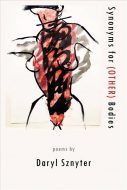 Daryl Sznyter
Daryl Sznyter
Synonyms for (OTHER) Bodies
NYQ Books
Reviewer: Ann Wehrman
Peppering her poems with ampersands and i in the lower case, sans capitalization at sentences’ starts, Daryl Sznyter shoulders her way into the reader’s mind like a tough girl in a leather jacket: lipstick deep red, purple, or black; nails chipped; attitude a screwdriver or lever to pry open readers’ consciences, and in some cases, touch on painful memories. Sznyter writes unapologetically, expressively, and viscerally about relationships, self-image and self-respect, sexuality, the body, and life as a woman in today’s world, in which the objectification, misuse, repression, rape, and murder of women are old news. Reading these poems, one is taken on an emotional journey, as Sznyter’s evocative narratives and images shine a headlamp on wounds that far too many people bear, unhealed, for life. However, light and fresh air can help heal wounds, and similarly, exposing injuries of the heart through poetry may help people understand how wrong the status quo really is and begin to cherish themselves and others.
Sznyter illustrates the problem in “what you learn when you only speak when spoken to”:
a dress is not a dress unless the kneecaps
have an agenda nobody notices a new hair-
cut unless it exposes the neck. the face is invisible
until it is painted on. the little boy at the park
usurps his sister. if you don’t believe it, ask
for her name. she is a board game with flexible
instructions. we are multiple choice questions
answered all of the above.
our mothers sent us to charm school to learn
how to act but never raised our brothers
to be ashamed of their erections.
If the reader wonders why young boys should be “ashamed of their erections,” which after all are natural and healthy, consider Sznyter’s implication—boys’ bodies and sexuality are acceptable and appropriate (awesome, in fact!), though girls’ bodies are suspect, to be exploited and controlled as society demands, their naturally healthy power repressed. Despite feminism’s hard work and sacrifice, which has brought some growth in consciousness, the great mass of humanity still subjugates and objectifies females, including all aspects of female sexuality, as a matter of course, as evidenced by the “need” for bras, weight management, and makeup starting in middle school (in the U.S.), and in more horrific ways, including female genital mutilation, child marriage, and normalized violence, worldwide.
Sznyter urges the reader to understand the value of empowerment and respect for the female body and natural unfolding of the senses for women, in contrast to suppression, “breaking,” and abuse. In “Tutu Girl at a Rock Concert,” Sznyter writes of watching as “a mother and daughter hold hands and imitate / the singer from the back row. the daughter wears / a tutu in the crowded stadium & nobody hurts her.” The poem deepens, reflecting:
… i consider my own mom,
& the make-pretend treasure
chests she’d gift me for my birthday,
enticing me with the idea that i really could be
a princess, but only behind dusty curtains,
hidden from our neighbor
& his binoculars. i’d grow up the way
i remember her then: breaking.
breaking up, breaking, always speaking
as someone hearing her voice through a tape
recorder for the first time, suffocating …
This descent into painful memories of abuse contrasts poignantly with the natural, unsullied joy of the “tutu girl,” the jouissance that remains trapped and hidden within all who have been hurt by sexual abuse. Sznyter walks the reader toward the light at the end of the poem:
how giddy the little girl in the tutu
must feel to sing & shake her rump,
unaware of anything outside
the swish of tulle against
her thighs & the squeeze
of her mother’s hand.
The poet rages in “Under the Skin (2013 film),” her words peeling off layers of pain, Sznyter’s merciless diction as precise and creative as the work of a thirty-star chef:
they don’t know what vacuous
means the first thing they see
is your hair your hair
that doesn’t even belong to you
then a bra like texturized daisies
panties pasty like pastry and delicious
too let each one think you seduced
them the daisies the pastry
won’t save you the lumberjack
will still rape you he will burn you
Despite the dark water that Sznyter navigates in Synonyms for (OTHER) Bodies, the poems reveal tenderness locked away carefully, to be shown only rarely. One such moment occurs in “Bald Mountain”:
you tell me everyone is
going to die and that is life
that is not life i say
. . .
… life is the only blueberry
bush on the mountain
that we will walk through
miles of bramble for …
. . .
later life is deer that are not caught
in any headlights it is red birds blue birds
. . .
life is the chiseled names on the resting
place at the top of the mountain
KS, SB, TT + FN together forever
circa 1897
Holding firmly to the life force of true love and the purity and innocence of deer and beautiful birds, the poet draws attention to a sense of humanity that perhaps endures within all or at least most people, like coals banked, despite the soul’s unhealed infection and heavy scars.
Ultimately, Synonyms for (OTHER) Bodies speaks of the value of women freely expressing their fears, worries, desires, feelings, passions, whatever—a basic issue at the heart of the persistent fight for women’s equal rights. In this country where the ERA has yet to be passed, in this world in which far too many women still lack awareness of their equality with men and lack freedom and safety to grow into their full potential unharmed, may all who read these poems have “ears to hear,” as Sznyter speaks truth, however slanted.

